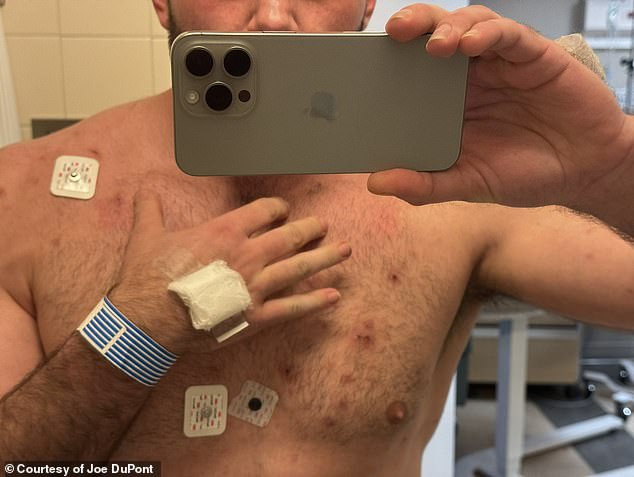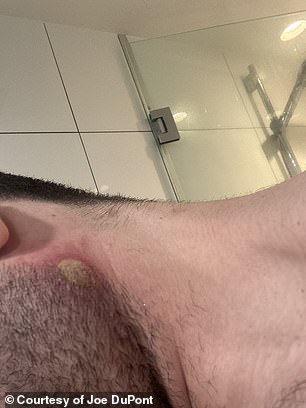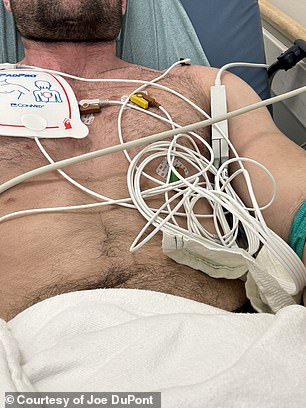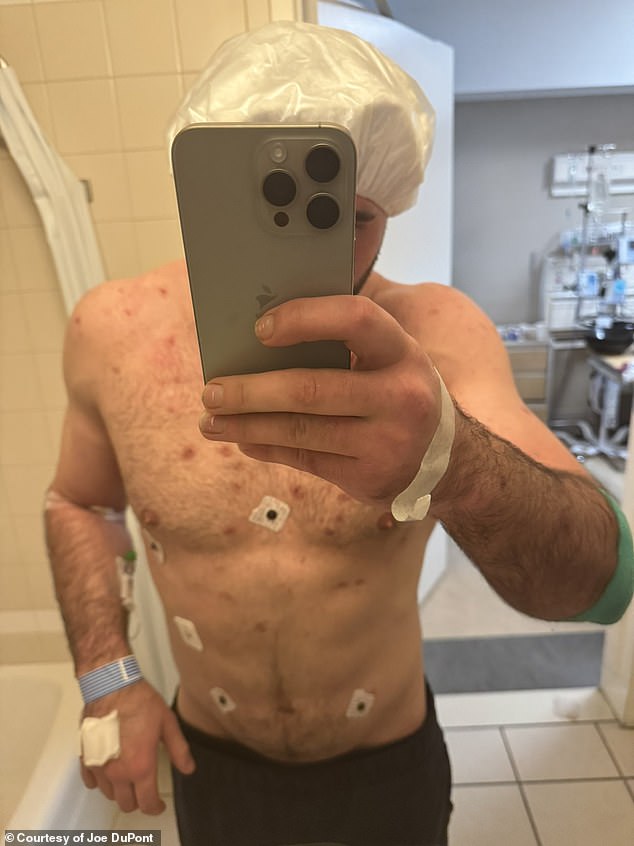Doctors mistook my fatal sepsis for anxiety and sent me home from the hospital… I’m lucky to be alive
A young California man is warning healthy Americans not to ignore alarming symptoms after he was diagnosed with fatal sepsis despite being ultra-fit.
In late April, Joe DuPont, 28, noticed red spots on his neck, chest and other parts of his body. At first, Mr. DuPont, who is regularly active, assumed the rapid-onset rash was just a normal skin reaction.
But when the spots stopped healing after a day and started to ooze, he started to worry. “When I realized it wasn’t going away, I went to the hospital,” Mr. DuPont, who works on the business side of the clinical laboratory industry, told DailyMail.com.
The worst of it on the left side of his neck was filled with pus and fluid and was opening up more and more. However, on April 29, doctors at the local hospital dismissed the symptoms as anxiety and a skin infection, and prescribed steroid cream and oral antibiotics.
It was a crucial mistake because less than 24 hours later, DuPont suffered a life-threatening heart attack due to sepsis, an immune system overreaction that kills one American every 90 seconds.
Joe DuPont, 28, was active and living a healthy lifestyle when his sepsis symptoms started. He now emphasizes that ‘anyone can experience this’

Mr. DuPont suffered from a spreading rash and fluid retention. When he experienced a cardiac event, doctors realized he had sepsis
Now, less than two months after the near-death experience and on the road to recovery, Mr. DuPont is focused on raising awareness about medical errors and sepsis, the leading cause of death in U.S. hospitals.
“I’m incredibly lucky to have come out of this the way I did,” he said. ‘This happens to so many people. Anyone can experience this.’
Sepsis is responsible for 300,000 deaths in America each year and occurs when an infection causes a bizarre overreaction of the immune system, causing chemicals in the bloodstream to go haywire.
Instead of sending infection-fighting white blood cells to attack a foreign invader, it targets healthy tissues and organs such as the limbs, lungs and kidneys, leading to organ failure and sometimes amputations.
Yet a third of Americans have never heard of it, and for every hour treatment is delayed, the risk of death increases by four to nine percent.
Mr. DuPont noted that although he told doctors he felt a little anxious, he was surprised that this was part of the main diagnosis.
At home, shortly after his symptoms were resolved by doctors, Mr. DuPont’s legs began to tremble and cramp. “I took it as a sign that maybe my body was healing,” he said.
But the next morning, “I woke up in much worse shape and just felt completely different.”
‘When I stood up, I felt the moisture rushing down my legs, as if the moisture was literally pooling in my sandals. I realized, ‘I have to go back to the ER.’
On the way there, Mr. DuPont’s heart began to pound amid severe chest pains, and he began to lose his vision, develop a fever and feel like fluid was spreading through his body. When he finally got there, he felt so weak that he could barely walk to the triage room.
An EKG revealed an irregular heartbeat and fluid collecting around his heart.
He soon developed a serious heart condition, with his heart rate peaking and then dropping to the 30s. A normal resting heart rate is between 60 and 100 beats per minute.
“It was close,” he said. “I pretty much got through it when everything went black.”


“It was close,” DuPont said of his near-death experience from sepsis. “I pretty much got through it when everything went black.”

Mr. DuPont is now working to raise awareness about sepsis. “Ultimately, I see this as a good thing that gave me appreciation and perspective that I wouldn’t have otherwise.”
Mr. DuPont had had sepsis, although it is unclear whether it was caused by a skin infection or some other underlying pathogen.
Further tests performed during the hospital stay indicated endocarditis, an inflammation of the inner lining around the chambers and valves of the heart.
This is usually caused by an infection that travels through the bloodstream and attaches to the heart. It is most common in older people, but also in people with damaged or artificial valves.
In addition, an echocardiogram indicated tricuspid valve regurgitation, which happens when the heart’s tricuspid valve does not close properly, causing blood to flow backward.
Over time, this can lead to an irregular heartbeat called atrial fibrillation (AFib) and heart failure if left untreated.
Mr. DuPont has since been released from the hospital, although he continues to suffer from heart-related side effects.
He now focuses part of his time on raising awareness about the dangers of misdiagnosis and medical errors by connecting with groups like Global Sepsis Alliance and connecting with other young survivors.
Dr. Steven Simpson, professor of medicine at the University of Kansas and president of the Sepsis Alliance, previously told DailyMail.com that so many cases of sepsis in the US are misdiagnosed because “doctors are not given enough information to help them diagnose sepsis.” ‘
Cases are also increasing, up 20 percent from 2019 to 2021, according to the latest CDC data.
But despite this, the US does not have a comprehensive strategy to tackle the problem. In fact, a quarter of U.S. hospitals have no sepsis protocol at all.
“It was very interesting to learn more about sepsis after this experience,” Mr. DuPont said. ‘I find it astonishing to hear what people have experienced with this.’
‘I’ve been healthy pretty much my entire adult life. I just never expected to experience something like this, and I think it’s important that people are aware that this can happen.”
“Ultimately, I view this as a positive experience that gave me appreciation and perspective that I would not otherwise have.”
